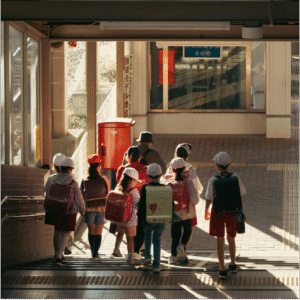Harbingers’ reporters from the 2025 Japan Newsroom interview youth on the decreasing birth rate in Japan

'In 2024, the number of births hit a new record low of 686,061 since records began.'
Picture by: Tien Nguyen | Pexels
Article link copied.
August 6, 2025
Hiroshima youth hesitant to have children amid financial instability
Young Japanese people in Hiroshima are hesitant to have children despite the population crisis due to financial and social instability.
27-year-old Yuka told Harbingers’ Magazine that she would choose to have children but the financial difficulties are discouraging her. She said she “couldn’t keep up with this lifestyle,” meaning that she would have to cut down her costs on housing and discretionary expenses.
According to her, the ageing population will become a serious problem in the near future.
She believes that the government could provide further child support to battle low fertility rates in Japan.
Harbingers’ Weekly Brief
According to the provisional data released by the Japanese ministry of Health, Labour and Welfare, in 2024, the number of births hit a new record low of 686,061 since records began.
This is the 14th consecutive year for the population to decline. Now, on average, for every two deaths, only one child is born in Japan.
Out of Japan’s all 47 prefectures, the population only increased in two — Tokyo and Saitama.
Sisters Nishikawa, aged 23 and 19, shared the same concerns as Yuka.
“It’s important to have babies, but it’s hard with all of life’s expenses,” one of the sister said.
The other agreed, and added: “we don’t see many children around us – that is sorrow.”
According to experts, the main reason for the population crisis is that people in Japan are not getting married, which is due to the nation’s 30-year tussle with stagnant wages means that there’s now a surplus of what some describe as ‘economically unattractive’ men, so people are unable to afford having children, on top of high childcare costs, resulting in this evident decreasing population.
Economic stagnation has made it difficult for wages to keep up with the cost of living, making it hard for families to afford two children, which is necessary for direct generation replacement.
Apart from economic concerns of the population, there are social issues that contribute to the issue of decreasing birth rates in Japan.
Studies show that the average age of marriage for women in Japan has risen from being 24.2 years in 1970 to 29.3 years in 2013, according to the Ministry of Health, Labour and Welfare, which means that the total fertility rate (TFR) has also, consequently, been experiencing a rapid decline, leading to low birth rates and therefore an ageing population.
Although Japan still suffers from the lowest birth rate of all, having only 6.9 births per population, according to the US Central Intelligence Agency (CIA) results from 2024, South Korea had also experienced difficulties from having low birth rates, where there were only 7.0 births per 1,000 population.
As of 2024, the births per 1,000 people decreased in all G7 countries. It was the lowest in Japan, at 6.9, with Italy being the second lowest at 7.1, while the US has the highest birthrate among G7 countries, with 12.2 births per 1,000 people.
Among Asian countries, China has 10.2 births per population while India has reached 16.2 births per population at present, all rising above Japan.
Written by:

Writer
Hong Kong
Born in 2009 in Hong Kong, Jamie studies in Cheltenham, United Kingdom. She is interested in true crime and psychology, planning to study law in university. For Harbingers’ Magazine, she plans to write about human rights, society, and cover legal issues that impact daily lives.
In her free time, Jamie enjoys philosophy, reading about unsolved crimes and making jewellery. She also plays volleyball as part of her school team and runs a collaborative writing club in her school.
Jamie speaks English, Cantonese and Mandarin.

Politics Section Editor 2025
Warsaw, Poland
Born in 2008 in Warsaw, Poland, Klara joined Harbingers’ Magazine to cover international affairs, crime, and music.
She joined the magazine in March 2024, writing numerous articles on politics and music. In 2024, she reported on the US presidential elections on the ground and, in February 2025, covered the Middle East crisis from Amman, Jordan. Her strong writing skills led to her appointment as Politics Section Editor in March 2025. Simultaneously, she will serve as the Poland 2025 Presidential Election Newsroom Editor.
In the future, Klara plans to study psychology, international politics, or criminology, preferably in the United States.
In her free time, she enjoys reading, dancing, listening to music, and exploring pop culture—particularly how Broadway and West End adapt classic Disney stories into musicals.

Writer
Bali, Indonesia
Born in 2007 in Malmo, Elias has studied in Sweden, Chile, California, North Carolina, and Bali. He is interested in business, entrepreneurship, management and international relations and plans to study along those lines. For Harbingers’ Magazine, he writes about economics, society, international relations, and sports.
In his free time, Elias plays football, does Maui Thai, goes to the gym, enjoys riding motorbikes and spending quality time with friends and family. He has played high level football his entire life and runs a microbusiness teaching football to young athletes.
Elias speaks English and Swedish.
🌍 Join the World's Youngest Newsroom—Create a Free Account
Sign up to save your favourite articles, get personalised recommendations, and stay informed about stories that Gen Z worldwide actually care about. Plus, subscribe to our newsletter for the latest stories delivered straight to your inbox. 📲
© 2025 The Oxford School for the Future of Journalism


